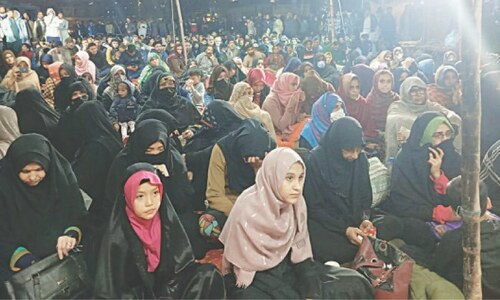KARACHI: Soon after Chief Minister Syed Qaim Ali Shah resolved during a meeting with the Gates Foundation officials that Sindh would make polio a thing of the past next year, the province received confirmation from Islamabad on Tuesday that a child, around two years old, became the 12th polio victim from Sindh this year.
Rafia, daughter of Ghulam Hussain, was one of the ill-fated children in the country whose samples had been sent to the National Institute of Health (NIH), Islamabad for examination, which confirmed it seven weeks after their arrival.
Also read: Seven polio cases detected as year’s toll rises to 115
Officials in the expanded programme on immunisation (EPI) of Sindh said Rafia’s family lived in a house in UC-8 of Gadap — the third case from the same union council and fifth from Gadap Town.
They said the child belonged to a Pakhtun family which originally hailed from the Federally-Administered Tribal Areas (Fata) and migrated to Karachi a few years ago. However, they held similar suspicions against the vaccination as their relatives and friends hold in the mountains.
Dr Zafar Ijaz, director for health services, Karachi, said the child had not been vaccinated in the immunisation campaigns because of the refusal by her family.
A one-year-old child inflicted with polio in Sindh was confirmed with the crippling disease three weeks ago.
The lack of vaccination was not the reason for Rafia’s fate. In fact there are few polio cases across Pakistan, including Sindh that were administered at least one dose but have tested positive for the crippling disease.
The reasons that the officials would investigate include checking whether efficacy of the vaccine is lost due to ineffective cold chain management.
Besides, due to limited and/or restricted access in certain areas and failure to regularly conduct immunisation campaigns the immunity against the virus is very low. This mean the virus is circulating in the area and while children are vaccinated their low immunity prevents them from being fully protected. Besides, malnutrition could also weaken the immunity.
Most polio cases were primarily caused by the non-administration of polio vaccine either because of the family’s refusal or, in the Fata, where polio volunteers were not able to reach to them because of security impediments.
Barring a two-year-old child from a village of the Sanghar district, the rest of 11 polio cases have been reported from Karachi and nine of them belonged to the families of Pakhtun origin.
Since June 1 when the World Health Organisation (WHO) imposed travel restrictions on Pakistan for its staggeringly high contribution to the polio cases in the world, the country has recorded 77 polio cases out of which six were reported from Sindh.
Meanwhile, sharing his views with a 10-member delegation of the Bill & Melinda Gates Foundation, CM Shah said his government had put combat against polio on its key priorities to get the status of polio-free Sindh by 2015.
Published in Dawn, September 17th, 2014















































Dear visitor, the comments section is undergoing an overhaul and will return soon.